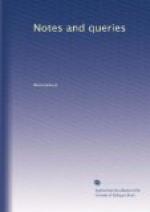“Sachent tous que Mons.
Gualhard de Dureffourt ... ad recue ...
quatorze guianois dour
et dys sondz de la mon[oye] currant a
Burdeux.”
The date is 12. Nov. 1387. The document is quoted in Madox’s Baronia Anglica, p. 159. note d.
A.J.H.
Parish Registers Tax.—In the Parish Register of Wigston Magna, Leicestershire, are the following entries against several dates in the Baptisms and Burials:—
1784. Septr. 5th (Burials), “P’d Tax to y’s Day.” —— Novr. 28th (Baptisms), “p’d Tax.” 1785. Octr. 14th (Baptisms), “p’d Tax to this Day.” 1786. Septr. 12th (Christenings), “p’d tax to this Day.” 1786. Septr. 1st (Burials), “p’d tax to this Day.” 1787. July 31st (Baptisms), “P’d Tax to this Day.” —— Septr. 27th (Burials), “P’d Tax to this Day.”
I should be glad to be informed what tax is here referred to. These are all the entries of the kind.
ARUN.
Charade.—Can any of your readers help me to a solution of the following poetical charade, which I believe appeared in the Times newspaper a few years back with this heading to it:—
“The following piece of mysticism has been sent to us as original, with a request for a solution. The authorship is among the secrets of literature: it is said to have been by Fox, Sheridan, Gregory, Psalmenazar, Lord Byron, and the Wandering Jew. We leave the question to our erudite readers.”
“I sit on
a rock
While I’m
raising the wind,
But the storm
once abated,
I’m gentle
and kind;
I see kings at
my feet,
Who wait but my
nod,
To kneel in the
dust
Which my footsteps
have trod.
Though seen by
the world,
I’m known
but to few;
The Gentiles detest
me,
I’m pork
to the Jew.
I never have past
But one night
in the dark,
And that was with
Noah,
Alone, in the
ark.
My weight is three
pounds,
My length is a
mile,
And when I’m
discover’d,
You’ll say,
with a smile,
My first and my
last
Are the wish of
our isle.”
I should be obliged if any body could give me a key to this.
QUAESTOR.
* * * * *
+Replies.+
HOWKEY OR HORKEY.
Howkey or Horkey (Vol. i. p. 263.) is evidently, as your East Anglian correspondent and J.M.B. have pointed out, a corrupt pronunciation of the original Hockey; Hock being a heap of sheaves of corn, and hence the hock-cart, or cart loaded with sheaves.
Herrick, who often affords pleasing illustrations of old rural customs and superstitions, has a short poem, addressed to Lord Westmoreland, entitled “The Hock-cart, or Harvest Home,” in which he says:—




